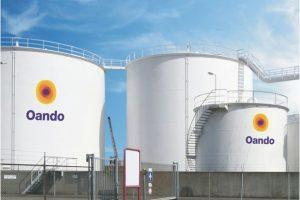
Energy firm reports 20% revenue drop but 164% profit surge amid shift to crude and gas trading….
Oando Plc has suspended the importation of petrol into Nigeria as the commencement of domestic fuel supply from the Dangote Refinery continues to transform the country’s downstream petroleum sector.
The indigenous energy company said the move, driven by market realignment and growing local refining capacity, has led to a 20 percent decline in trading revenue but a significant rebound in profit.
Oando disclosed this in its half-year and nine-month 2025 financial reports, noting that the trading segment came under pressure following a drop in Premium Motor Spirit (PMS) imports.
“Our trading segment faced headwinds which exerted pressure on revenue and topline performance due to declining PMS imports resulting from rising local refining capacity at the Dangote Refinery,” the company said in its H1 filing.
“This development, though challenging, is a positive one for Nigeria’s energy security and self-sufficiency.”
Revenue Falls, Profit Soars
According to its nine-month results, Oando’s revenue fell by 20 percent year-on-year to ₦2.5 trillion in 9M 2025, down from ₦3.2 trillion in the same period of 2024. The company attributed the drop to reduced gasoline imports, partially offset by stronger upstream oil production.
Gross profit also declined by 42 percent, sliding from ₦194 billion to ₦113 billion, in line with the topline contraction and changing revenue mix.
Despite this, the company posted a 164 percent increase in profit after tax, which rose to ₦210 billion from ₦76 billion a year earlier, driven by higher production volumes and the resolution of legacy receivables.
“Profit after tax increased by 164 percent to ₦210bn, supported by stronger production and recoveries,” the firm stated.
Shift from PMS to Crude and Gas
Oando said it deliberately paused its petrol trading activities during the review period to adjust to the new market structure created by Dangote’s ramp-up in domestic refining.
“The trading division continued to execute its priorities despite market volatility. A total of 21 crude oil cargoes (19.8 million barrels) were traded during the period, up from 15 cargoes (16.7 million barrels) last year,” the company reported.
It added that refined product volumes remained subdued, describing the Dangote Refinery’s dominance as a “well-deserved success” that has reshaped Nigeria’s fuel supply dynamics.
“With the refinery now fulfilling its intended role in meeting national fuel needs, Oando has redirected focus to higher-margin crude and gas trading opportunities,” the firm said.
Diversification and New Focus
To cushion the impact of declining PMS volumes, Oando said it has diversified its crude offtake sources, optimised trade flows, and expanded into new commodities such as liquefied natural gas (LNG) and metals.
“These initiatives are already gaining traction and will support stronger performance going forward,” the company added.
Looking ahead, Oando plans to deepen its crude trade flows, strengthen offtake-linked financing structures, and accelerate entry into gas and metals trading, in line with its strategy to build a balanced, future-ready energy portfolio.
Dangote’s Market Impact
The 650,000-barrels-per-day Dangote Refinery, which began production in 2024, has quickly become a dominant player in Nigeria’s energy market. The facility now supplies much of the country’s petrol and diesel, sharply cutting reliance on imports.
To reinforce this shift, the Federal Government recently introduced a 15 percent import duty on petrol and diesel to discourage foreign imports and protect local refineries.
Analysts say the new tariff, combined with Dangote’s expanding output, will likely push independent importers out of the market and accelerate Nigeria’s transition to domestic fuel self-sufficiency.



